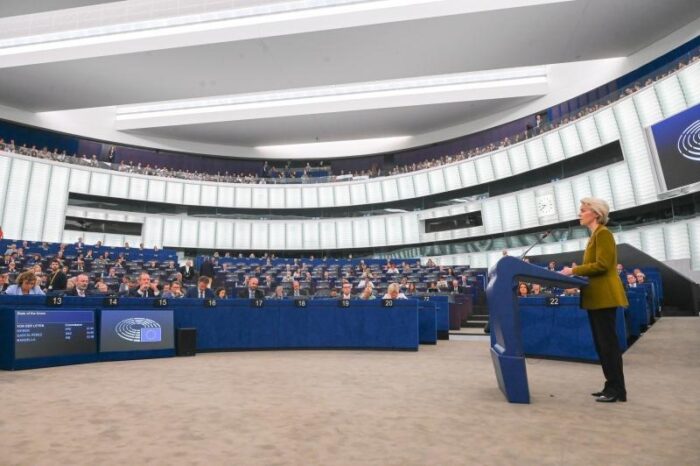Find all related Progressive Post
Progressive Post

In an era of growing social uncertainties, global competition and challenges in climate adaptation and mitigation, a progressive European Union must assert itself on the world stage and vigorously uphold its distinctive social model. The revival of strategic investments and the consolidation of social Europe will headline the agenda during Belgium’s presidency of the Council of the European Union.
In the realm of employment and social policy, Belgium’s presidency is committed to shaping an ambitious and future-oriented agenda. Leveraging the European Pillar of Social Rights (EPSR) is paramount to establishing fair conditions for minimum social rights within the EU. The aim is to enhance job quality and ensure accessible social protection for all workers and self-employed individuals. This is crucial, especially as potential EU expansions could widen economic development gaps within the Union.
Belgium will lead discussions on fully integrating the EPSR into the framework of European economic governance, reinforcing social equity. This aligns with Belgium’s proposal for a social convergence framework within the European Semester, reflecting a broader intent to involve the EPSCO filière in the realm of economic governance, which will be materialised through the ‘jumbo’ combined Employment, Social Policy, Health and Consumer Affairs as well as Economic and Financial Affairs Council on 12 March 2024. Additionally, a European Charter of Rights could empower workplace democracy and collective negotiations. A significant milestone during the Belgian presidency in this domain will be the Social Summit of La Hulpe on 15 and 16 April.
In addressing health crises, the EU must fortify the European Health Union, securing healthcare personnel, bolstering resilience, and ensuring swift access to quality, affordable and eco-friendly medicines. Belgium calls for EU support in maintaining healthcare personnel availability amid demographic, social and technological shifts.
At the same time, Belgium will chair discussions on the Union’s role in supporting investment to address future challenges. In 2020, the EU launched the NextGenerationEU initiative, with the Resilience and Recovery Facility (RRF) as its centrepiece. As Belgium’s member of the government in charge of the RRF, I have worked to maximise our country’s allocation, as later complemented by RePowerEU following the war in Ukraine and the need to strengthen EU’s strategic autonomy in the energy sector.
While the design of the RRF is revolutionary in terms of funding sources and conditionality, the instrument has encountered initial challenges. Ensuring the optimal success of this instrument, which embodied a united response from the European Union to the health crisis, is in our best interest as it paves the way for a genuine European budgetary capacity. Operational improvements can be introduced to guarantee the utmost success of the RRF. Belgium is dedicated to starting a dialogue with the Council and the Commission to extract lessons from the mid-term evaluation of the instrument, with a specific focus on streamlining procedures and prioritizing critical objectives.
Beyond operational enhancements and fine-tuning, a significant concern looms over the RRF: its expiration. The final projects supported by the RRF must be completed by the end of 2026. However, it is not a credible argument to suggest that the challenges of the dual transition (climate and digital), not to mention other EU priorities such as cross-border interconnections, innovation, and health, can be fully addressed by this deadline. Therefore, a top priority during Belgium’s presidency will be to elevate the concept of ‘strategic investments’ on the EU agenda and emphasise the imperative to explore every possible avenue to sustain (and accelerate) the momentum of investments in crucial sectors like climate, energy, mobility, digital, health, and education. A crucial one-day high-level conference will be organised on 9 April, focusing on the theme of the RRF and strategic investments.
While the EU economic governance reform anticipated during the presidency is expected to include some limited additional budgetary flexibility, it falls short of meeting the demands of an EU fully committed to its climate and social priorities. Hence, Belgium aims to spark a policy debate regarding the trajectory of the EU’s strategic investments post-RRF. We will strive to sustain the EU’s investment momentum, not only to address the aforementioned priority policy areas but also due to its direct economic stimulative impact, both in the short and long term, as supported by a growing body of economic literature. Additionally, Belgium is dedicated to initiating a discussion on how to integrate social mainstreaming into European investment programs, akin to the incorporation of the ‘do-no-significant-harm’ principle from the green taxonomy into the RRF.
The EU stands at a crossroads, necessitating a bold transformation to capitalise on the opportunities amidst the current emergency. Inaction is no longer an option. As we grapple with existential threats to our planet, social model and democracy, European leaders face a pivotal question: will they rise to the transformative challenge and embrace a progressive agenda? A resilient and inclusive European future, championing both social values and forward-looking investments is within our grasp. Belgium, in its Council presidency, pledges to play a vital role in driving this ambitious endeavour.
Photo credits: Belgian Presidency of the Council of the European Union / Vlad Vanderkelen
| Cookie | Duration | Description |
|---|---|---|
| cookielawinfo-checkbox-advertisement | 1 year | Set by the GDPR Cookie Consent plugin, this cookie is used to record the user consent for the cookies in the "Advertisement" category . |
| cookielawinfo-checkbox-analytics | 11 months | This cookie is set by GDPR Cookie Consent plugin. The cookie is used to store the user consent for the cookies in the category "Analytics". |
| cookielawinfo-checkbox-functional | 11 months | The cookie is set by GDPR cookie consent to record the user consent for the cookies in the category "Functional". |
| cookielawinfo-checkbox-necessary | 11 months | This cookie is set by GDPR Cookie Consent plugin. The cookies is used to store the user consent for the cookies in the category "Necessary". |
| cookielawinfo-checkbox-others | 11 months | This cookie is set by GDPR Cookie Consent plugin. The cookie is used to store the user consent for the cookies in the category "Other. |
| cookielawinfo-checkbox-performance | 11 months | This cookie is set by GDPR Cookie Consent plugin. The cookie is used to store the user consent for the cookies in the category "Performance". |
| csrftoken | past | This cookie is associated with Django web development platform for python. Used to help protect the website against Cross-Site Request Forgery attacks |
| JSESSIONID | session | The JSESSIONID cookie is used by New Relic to store a session identifier so that New Relic can monitor session counts for an application. |
| viewed_cookie_policy | 11 months | The cookie is set by the GDPR Cookie Consent plugin and is used to store whether or not user has consented to the use of cookies. It does not store any personal data. |
| Cookie | Duration | Description |
|---|---|---|
| __cf_bm | 30 minutes | This cookie, set by Cloudflare, is used to support Cloudflare Bot Management. |
| S | 1 hour | Used by Yahoo to provide ads, content or analytics. |
| sp_landing | 1 day | The sp_landing is set by Spotify to implement audio content from Spotify on the website and also registers information on user interaction related to the audio content. |
| sp_t | 1 year | The sp_t cookie is set by Spotify to implement audio content from Spotify on the website and also registers information on user interaction related to the audio content. |
| Cookie | Duration | Description |
|---|---|---|
| CONSENT | 2 years | YouTube sets this cookie via embedded youtube-videos and registers anonymous statistical data. |
| iutk | session | This cookie is used by Issuu analytic system to gather information regarding visitor activity on Issuu products. |
| s_vi | 2 years | An Adobe Analytics cookie that uses a unique visitor ID time/date stamp to identify a unique vistor to the website. |
| Cookie | Duration | Description |
|---|---|---|
| NID | 6 months | NID cookie, set by Google, is used for advertising purposes; to limit the number of times the user sees an ad, to mute unwanted ads, and to measure the effectiveness of ads. |
| VISITOR_INFO1_LIVE | 5 months 27 days | A cookie set by YouTube to measure bandwidth that determines whether the user gets the new or old player interface. |
| YSC | session | YSC cookie is set by Youtube and is used to track the views of embedded videos on Youtube pages. |
| yt-remote-connected-devices | never | YouTube sets this cookie to store the video preferences of the user using embedded YouTube video. |
| yt-remote-device-id | never | YouTube sets this cookie to store the video preferences of the user using embedded YouTube video. |
| yt.innertube::nextId | never | This cookie, set by YouTube, registers a unique ID to store data on what videos from YouTube the user has seen. |
| yt.innertube::requests | never | This cookie, set by YouTube, registers a unique ID to store data on what videos from YouTube the user has seen. |
| Cookie | Duration | Description |
|---|---|---|
| COMPASS | 1 hour | No description |
| ed3e2e5e5460c5b72cba896c22a5ff98 | session | No description available. |
| loglevel | never | No description available. |


